Armend Ibrahimi was just two years old when the Democratic League of Kosovo (LDK) was established in 1989. However, the party that emerged as the predominant political force for Kosovar Albanians throughout the turbulent decade of the 1990s has long been a part of his family, and in turn, of Ibrahimi himself.
Today, the 25-year-old is president of LDK’s youth forum, a role he has held since May 2012. Fittingly, given the party’s proclaimed conservative values of positioning family as a cornerstone of its policies, Ibrahimi believes that his affiliation with LDK cannot be separated from those closest to him. “It cannot be denied that part of the influence [to join the party] came from my family,” says Ibrahimi, who first signed up to the party in 2009.
When Ibrahimi joined, LDK was already 20 years old, having forged its reputation as a party of intellectuals, writers and civil activists. Founded by 23 intellectuals from the Writers’ Association and daily Rilindja the party led the peaceful resistance against Slobodan Milosevic’s repressive regime during the ’90s and rejected the use of violence.
For Ibrahimi, part of the appeal of LDK was the connection he feels to the party’s central figure, the literary critic Ibrahim Rugova, who led the party for 17 years from its inception until his death in 2006. “I know and admire Rugova as a writer, and therefore there is no way his influence in my life is solely political,” Ibrahimi says, while also pointing to other prominent LDK figures from the past such as Fehmi Agani.
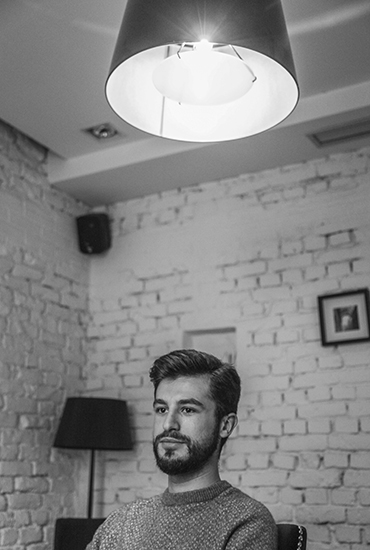
Armend Ibrahimi, has been president of LDK’s youth forum for four years, having first joined the party in 2009.
LDK is by not alone in terms of contemporary Kosovar political parties that herald key figures from the ’90s. Characters from the decade today dominate Kosovo’s political leadership, many having turned their hands to politics in the post-war period as new political parties began to flourish.
Today, the majority of the country’s political parties have become synonymous with their founding figures, with most parties having seen little turnover — if any — in leadership since they were formed. These central figures have taken on almost mythical statuses by their supporters and when considering what drives new generations of Kosovars to join political parties, are often cited as a key factor.
Most prominent amongst them is former prime minister, Hashim Thaci, who, in the immediate aftermath of the war, was one of a group of leading KLA figures to establish the Democratic Party of Kosovo (PDK). Thaci led the party for 16 years from its formation until stepping down earlier this year to become President of Kosovo. While he has been required to give up all political positions in his Constitutional role representing the “unity of the people,” he maintains significant influence within PDK and his portrait still hangs in the window of the party’s Prishtina headquarters.
Twenty-two-year-old law student Triumf Sadikaj, who heads PDK’s Prishtina youth forum, strongly admires both Thaci and his successor Kadri Veseli, another former KLA leader. “I believe that in the main political moments of Kosovo’s recent history, the two leaders had the key role and their decisions and work have brought great success to Kosovo,” he says.
In addition to Thaci’s prominent role in the 1999 Rambouillet negotiations that ultimately led to NATO’s intervention in Kosovo, as prime minister of Kosovo between 2007 and 2014 Thaci was the person who read aloud the country’s Declaration of Independence on February 17, 2008.
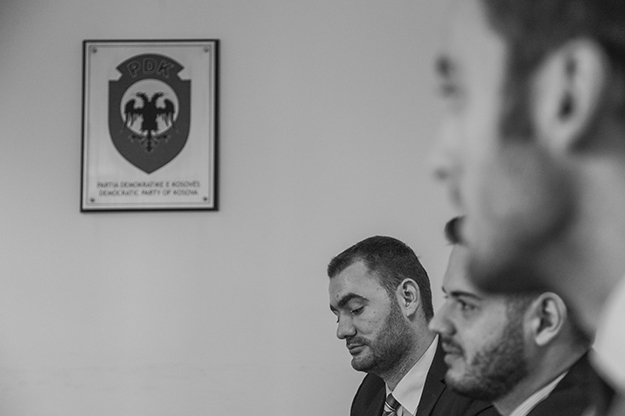
Head of PDK’s Prishtina youth forum Triumf Sadikaj (left) credits Hashim Thaci and Kadri Veseli with bringing “great success” to Kosovo.
In 2000, another former KLA figure, Ramush Haradinaj, chose to form his own political party, the Alliance for the Future of Kosovo (AAK), which he has headed ever since. “To tell you the truth, in [AAK] the main thing is the leader,” says the general secretary of AAK’s Alliance of Young People, Ekrem Ahmeti.
Forty-eight-year-old former KLA commander Haradinaj, who served as prime minister for 100 days in 2005, is revered as a war hero by his party’s supporters, and was given a state welcome upon his return to Kosovo in 2012 having been acquitted of war crimes charges in the International Criminal Tribunal for the former Yugoslavia.
For Ahmeti, being in a party where he is in close contact with an idol is important. “A young person, no matter if he is a member of the youth forum leadership or a youngster, has a direct link with the leader and the leader is young too,” he says. “He is a decision-maker who takes decisions that are in everyone’s interests.”
Traditions and values
AAK’s and PDK’s youngsters come largely from families that supported the KLA war with Serbia. Just like for Ibrahimi joining LDK, Leutrim Retkoceri’s decision to join PDK was heavily influenced by his family. “We start in principle from our traditions and values,” says the 26-year-old, who works in PDK’s communication office in Prishtina. “Family is very important in our society.”
Indeed, a 2012 Friedrich-Ebert-Stiftung’s (FES) survey found that family is the most trusted social institution amongst Kosovo’s young people, with 98 percent of 1,000 respondents considering the family as their most trusted institution. Many would agree that because of social, historical, economic and other factors, family still continues to play the central role for young Kosovars; most youngsters live with their families and are financially dependant on them until they finish their studies and find a job.
Such dependence easily translates into influence, with even young people who aren’t an active member of one party or another, often still expressing support for their family’s party because it is what’s expected of them. This sense of blind loyalty to family and party has proven problematic, with barely concealed attempts by political parties to pressurize voters and institutional nepotism rife. Earlier this year, leaked wiretapped calls between leading PDK figures that graphically exposes rampant cronyism at the very heart of government were met with little surprise by citizens.
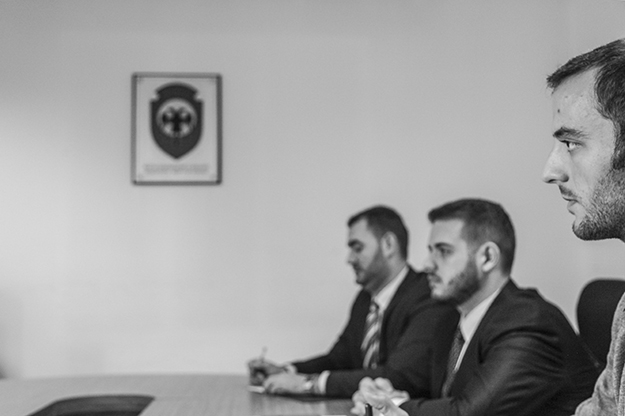
Leutrim Retkoceri (right), who works in PDK’s communication office, says that his family heavily influenced his decision to join the party.
Another motivation for Retkoceri to join PDK was the party’s stance on property. “I believe that if all our families are good, then our aim is to secure property [rights] which are sacred in terms of our past,” he says.
His prioritization of family and property is not unexpected as a member of a party that, just like LDK and AAK, professes a center-right, conservative ideology and which has previously used “Family, Property, State” as a key election slogan. The three parties all believe in the free market and have all supported the post-war privatization process that has seen dozens of state-owned companies sold off in recent years, although little else in any of their party platforms or policies points to clearly defined ideological platforms.
Such ideological ambiguity is reflected by PDK’s Sadikaj, who agrees with his party colleague that property and financial considerations are fundamental, while also raising traditionally leftist issues. “I believe that the economy is the determining factor in defining us as center-right,” he says. “We are defined as center-right taking into account the privatization process; we did not want to maintain state-owned enterprizes administered by the state. But on the other hand, we want social justice with pensions and jobs.”
Despite Sadikaj’s assertions, the issue of jobs is a contentious one in Kosovo, where unemployment continues to skyrocket, particularly amongst young people. In a country where over 50 percent of the population is under the age of 25, more than 55 percent of 15 to 24 year olds are unemployed.
For LDK’s Ibrahimi, while politicians should do more to address this issue, it is also a problem that extends beyond Kosovo’s borders. “The problem of unemployment among young people is a problem in all of south east Europe,” he says.
Radically different
That argument doesn’t stack up for many young people in Kosovo, who believe that the dire economic situation is the fault of PDK, LDK and AAK, who between them have been in government in one combination or another since the war. Either PDK or LDK has always been the senior coalition party and for practical purposes they have twice formed a coalition together, despite deep historical animosity and mistrust — even LDK politicians described the previous PDK-LDK coalition as “guns and roses.”
Many of those young people who felt frustrated with the established political parties found a political home for their discontent in 2010 when Vetevendosje decided to participate in elections for the first time, having initially formed as a ‘movement’ in 2005. Quickly becoming known — and also criticized — for its militant protests, Vetevendosje’s left-wing affiliations represented something markedly different to the governing parties.
Even after Vetevendosje entered into institutional life, its activists have continued to use direct action tactics consistent with its protest movement roots. Street protests — which have sometimes turned into confrontations with police — graffitied slogans and egging politicians are just some of the unconventional means used by Vetevendosje activists regardless of age.
Tinka Kurti worked as journalist for many years in different Kosovar media outlets before joining Vetevendosje two and a half years ago. The 27-year-old’s decision to join Vetevendosje was in line with the movement’s defiant stance against privatization of public enterprises and corrupt elites. “Being close to the news, being very well informed and seeing events close-up, I believe there have been moments that increased my belief that activities outside of politics are insufficient,” Kurti says. “The privatization of KEK [Kosovo Electricity Company] was one of the reasons to push my political engagement, likewise the protests in Merdare [Border with Serbia] for [trade] reciprocity [with Serbia] were key moments that persuaded me to engage.”
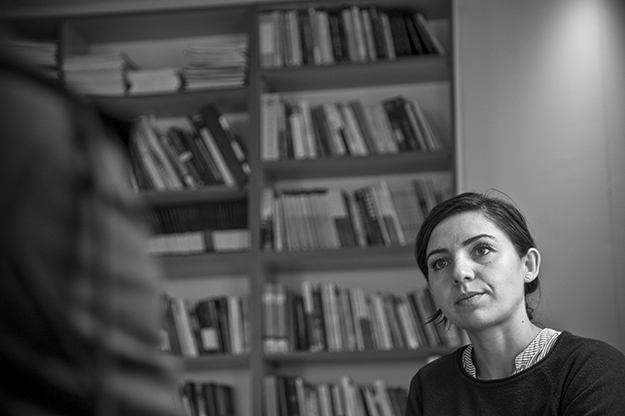
Tinka Kurti was a journalist before joining Vetevendosje in 2014 after becoming frustrated with the government’s privatization of state assets.
While in economic terms Vetevendosje has set out its stall as a left wing party, as the only major Kosovar political party to call for unification with Albania in its manifesto, it is also seen by many to have strong nationalist leanings. “I believe in the social democracy of Vetevendosje and I agree with the ideal of having one Albanian nation in the Balkans,” says Labinot Halimi, a 19-year-old history student from Ferizaj, who signed up to the party just a year and a half ago. “The program of Vetevendosje is different from the other parties … If I don’t like something within Vetevendosje and I think differently, my opinions are given the same weight as those of others.”
Unlike their peers in other parties, neither Kurti nor Halimi place much significance on the individual leaders within their party. “Indeed ‘the leader’ or ‘leadership’ are not words that I prefer to use in my daily vocabulary,” says Kurti, adding that the role of each devoted activist is significant.
However, according to Vetevendosje’s critics, the party is little different to Kosovo’s other political parties in terms of imposing strict, top-down procedures and there have been a number of instances of Vetevendosje members leaving the party, citing differences of opinion with the official party line, and accusing the leadership of rigid control.
Many also still see the former head of Vetevendosje, Albin Kurti, as a “spiritual leader,” with his name frequently chanted at Vetevendosje protests. Shooting to prominence in the late ’90s as one of the leaders of student protests against Milosevic’s regime, Albin Kurti worked in the KLA’s political office, before being arrested by Serbian forces in April 1999; he spent more than two and a half years as a political prisoner before his release in December 2001. After helping to establish the Vetevendosje movement, he became its first leader, a role he held unopposed until stepping down in 2015 and being replaced by Visar Ymeri.
Halimi says that despite the roles played by prominent Vetevendosje figures, no one person is bigger than the party itself. “I see them as good examples, but I do not see them as irreplaceable,” he says. “I see many activists in Vetevendosje that could be in the place of Ymeri or [Albin] Kurti.”
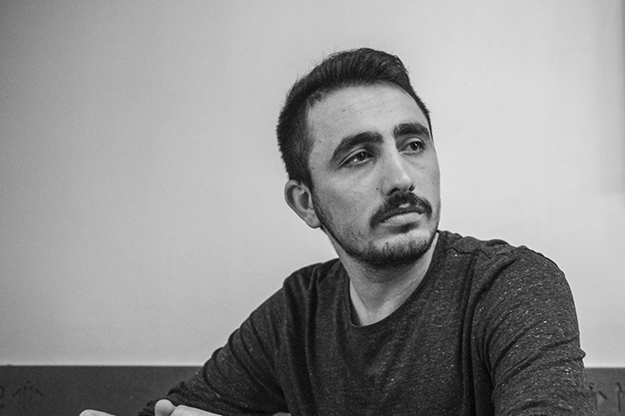
Labinot Halimi says that the opinions of all Vetevendosje activists are given equal weight, a point challenged by the party’s critics.
It is this profession of equality and the notion of party members all being activists regardless of their positions, that means unlike Kosovo’s other political parties, Vetevendosje has no dedicated youth forum. “Young people are part of society and should not be treated differently,” Tinka Kurti says. “Instead they should be part of the main forum and be part of decision-making. With special forums young people are separated, women are separated, and the serious politics remains in whose hands? Older men?”
According to Tinka Kurti it is not age that unites Vetevendosje’s activists, who regularly meet for discussions, lectures and films. “Despite the fact that Vetevendosje has the youngest [members] in terms of average age of all political parties … what makes Vetevendosje young in reality is not the age but the discontinuation of old politics by bringing completely new ideas,” she says.
In addition to their more philosophical activities, Vetevendosje’s young activists are well known for their active role in the party’s many protests. Critics accuse the party of using its young people for its own political purposes, mobilizing them with the intent of causing violence, a claim that the party denies.
Breeding ground or facade?
The approach of Kosovo’s other parties with regards its young members is in stark contrast to that of Vetevendosje. For PDK, the party’s youth forum is held up as a training ground for its leaders of tomorrow, with the inclusion of a number of previous youth forum members in government positions seen by current forum members as an inspiring success story.

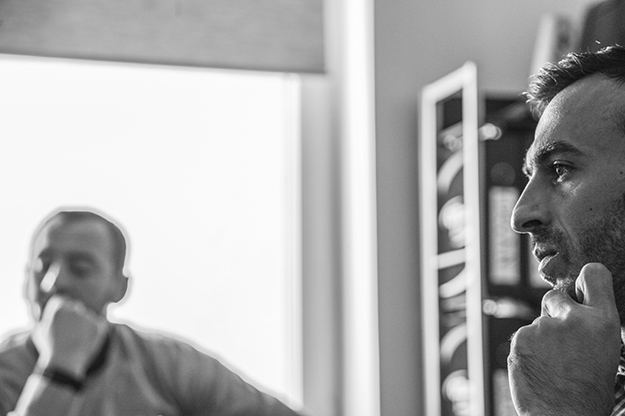

the use of the notion political generation in this text is erroneous. A political generation is an age-conscious group that mobilizes for social and political change, it is not the leaders of the youth forums of political parties.